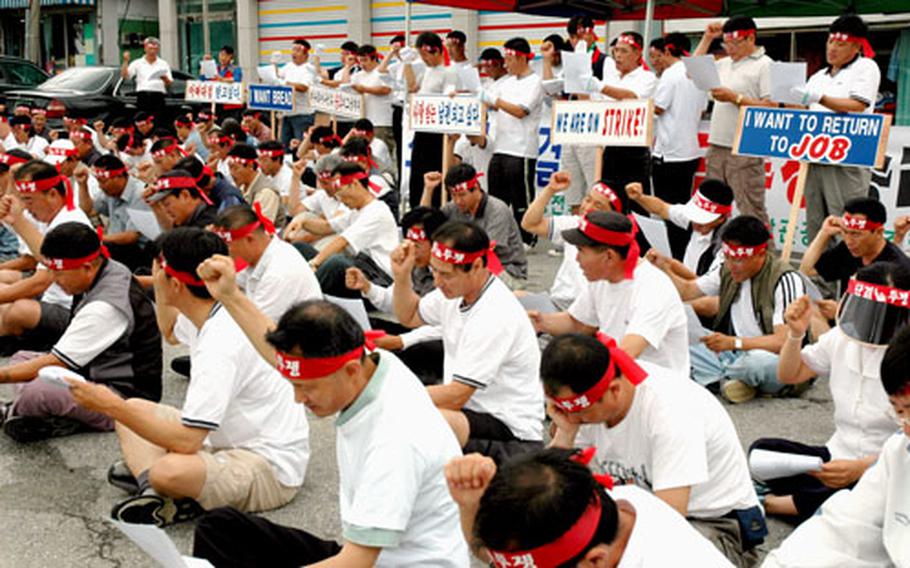
Taxi drivers from Worldcup Arirang protest outside Camp Casey in Dongducheon on Wednesday, day five of a taxi cab strike in Area I and Area II. (Teri Weaver / Stars and Stripes)
DONGDUCHEON, South Korea — A five-hour, overnight negotiation session between Worldcup Arirang Tourism Company Ltd. and its taxi drivers failed early Wednesday morning, with drivers still demanding a raise and company officials saying their only counteroffer would be to close the business, according to officials from both sides.
The negotiations – the first since taxi drivers stopped service on U.S. military bases in Areas I and II last weekend – were from 10 p.m. Tuesday to 3 a.m. Wednesday, both sides said.
Drivers have said they want a $105 monthly pay raise. The company says it is operating in the red and cannot afford to increase wages. Participants left the table without setting a date for future talks, union president Shim Woo-chang said Wednesday.
More than 100 taxi drivers from Area I – including Dongducheon and Uijeongbu – gathered outside Camp Casey Wednesday morning to protest the South Korean company’s management.
The group gathered about a block from Casey wearing red headbands labeled in Korean, encouraging the workers to unite in their fight. Other protest signs included, “I want to return to job,” “I want bread” and “Fight for wage increase” in both Korean and English.
“We, our cabbies, want to provide better and safer services all the time,” said Park Byeong-hui, 51, who has been driving on-base taxi cabs for 10 years.
Choi Byeong-sik, Arirang’s Dongducheon office manager, watched the protesters from a nearby sidewalk. He said he was not a part of the overnight negotiations but knew meeting details.
Choi said the company showed the union its financial statements, trying to prove its limited cashflow. “The union doesn’t want to believe it,” he said. The strike, he said, “can jeopardize my job here, and the taxi drivers may lose their jobs, too.”
Arirang contracts with the Army and Air Force Exchange Service to provide U.S. Forces Korea personnel with on- and off-base taxi service. AAFES officials have warned Arirang the strike is forcing AAFES to seek another taxi company.
On Wednesday, AAFES spokesman Air Force Master Sgt. Donovan Potter said, “We’re doing everything we can. We’re just hoping for the best.”
Union members voted on July 13 to strike, with 93 percent electing to stop driving, Shim said.
The drivers are asking for a 100,000-won monthly raise to their 400,000-won base salary, a $105 increase to $420.
All told, most drivers bring home $1,259 to $1,363 each month, not counting tips. That extra monthly money comes in government-required overtime pay, holiday and weekend pay and a regular monthly bonus of $105. The drivers also get to keep half of every cab fare they earn after meeting an $87 quota on each 13-hour shift, Shim said.
In recent weeks, union and company officials worked with a South Korean Labor ministry arbitrator to reach a settlement. The government official recommended a raise of 50,000 won, or $52. That was rejected, drivers have said.
Another demonstration was planned for Area II drivers in Seoul for this afternoon near Yongsan Garrison.